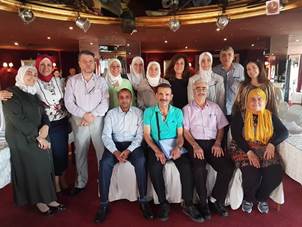 21 August 2017 – A total of 20 Syrian participants experienced in facilitating child and newborn health activities gathered in Damascus from 06 to 10 August 2017 to take part in the first national training of trainers course on “Caring for the newborn at home” organized by the WHO country office in Syria and the regional child and adolescent health and development programme, in collaboration with the Syrian Ministry of Health. This capacity-building activity aims to reduce neonatal morbidity and mortality in Syria, particularly in hard-to-reach areas. The training was facilitated by two regional experts from WHO supported by two national co-facilitators.
21 August 2017 – A total of 20 Syrian participants experienced in facilitating child and newborn health activities gathered in Damascus from 06 to 10 August 2017 to take part in the first national training of trainers course on “Caring for the newborn at home” organized by the WHO country office in Syria and the regional child and adolescent health and development programme, in collaboration with the Syrian Ministry of Health. This capacity-building activity aims to reduce neonatal morbidity and mortality in Syria, particularly in hard-to-reach areas. The training was facilitated by two regional experts from WHO supported by two national co-facilitators.
During the opening session, Dr Fadi Kassis, Director of Primary Health Care in the Ministry of Health of Syria thanked WHO for supporting primary health care activities in Syria, urged participants to gain the maximum out of the training and renewed commitment of the ministry of health towards newborns' and children's health. In his opening remarks, Dr Khalid Siddeeg, Medical Officer, child and adolescent health programe, introduced the training by stating the purpose of the training along with the specific objectives and expected outcomes. Dr Siddeeg emphasized the importance of engaging all stakeholders in an integrated manner and concluded by reaffirming the role of home care in reducing neonatal morbidity and mortality in the Syrian context.
The main objectives of the training were to:
- build the national capacity through training a pool of trainers on all components of newborn home care, including: developing communication skills and building a good relationship with the family when making a home visit; counselling the family on the importance of antenatal care, planning for birth in a health facility, home care for pregnant women and appropriate newborn care practice, including immediately after birth; assessing breastfeeding, danger signs and weight in a newborn deciding to refer or provide care at home depending on the results of the assessment, and advising families on optimal care practices for the newborn; and assisting families to provide extra care for the small baby.
- review and adapt the training material on caring for the newborn at home to the Syrian context.
Towards the end of the training, participants along with responsible programme managers discussed the implementation modalities and agreed on future steps to scale up “Caring for the newborn at home” interventions in Syria, in close collaboration with partners, mainly WHO, UNICEF and the United Nations Population Fund.








